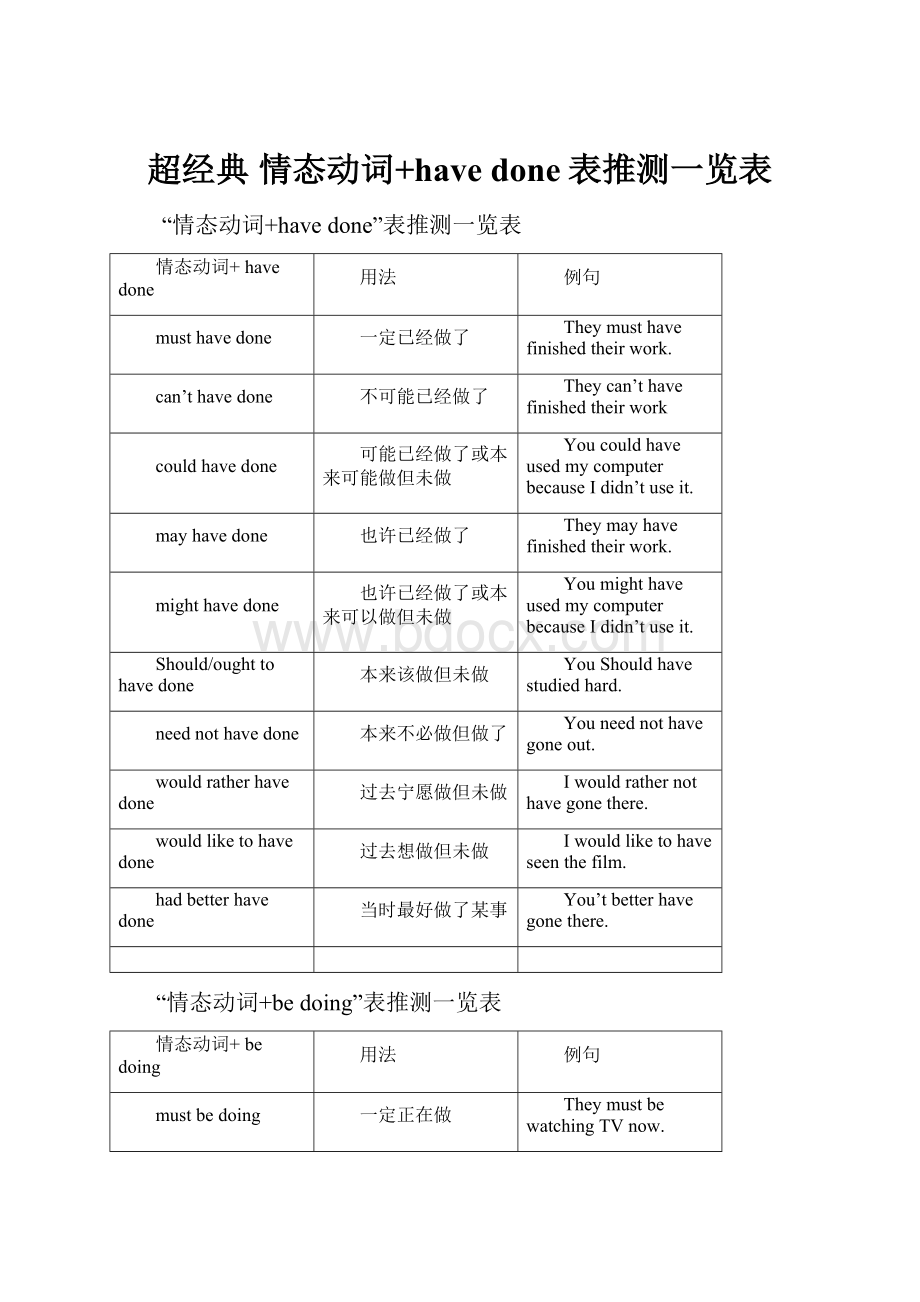超经典 情态动词+have done表推测一览表.docx
《超经典 情态动词+have done表推测一览表.docx》由会员分享,可在线阅读,更多相关《超经典 情态动词+have done表推测一览表.docx(12页珍藏版)》请在冰豆网上搜索。

超经典情态动词+havedone表推测一览表
“情态动词+havedone”表推测一览表
情态动词+havedone
用法
例句
musthavedone
一定已经做了
Theymusthavefinishedtheirwork.
can’thavedone
不可能已经做了
Theycan’thavefinishedtheirwork
couldhavedone
可能已经做了或本来可能做但未做
YoucouldhaveusedmycomputerbecauseIdidn’tuseit.
mayhavedone
也许已经做了
Theymayhavefinishedtheirwork.
mighthavedone
也许已经做了或本来可以做但未做
YoumighthaveusedmycomputerbecauseIdidn’tuseit.
Should/oughttohavedone
本来该做但未做
YouShouldhavestudiedhard.
neednothavedone
本来不必做但做了
Youneednothavegoneout.
wouldratherhavedone
过去宁愿做但未做
Iwouldrathernothavegonethere.
wouldliketohavedone
过去想做但未做
Iwouldliketohaveseenthefilm.
hadbetterhavedone
当时最好做了某事
You’tbetterhavegonethere.
“情态动词+bedoing”表推测一览表
情态动词+bedoing
用法
例句
mustbedoing
一定正在做
TheymustbewatchingTVnow.
can’tbedoing
不可能正在做
Theycan’tbewatchingTVnow.
May/mightbedoing
也许正在做
TheymaybewatchingTVnow.
口诀:
“情动”加上havedone,推测事情已经干;
“情动”加上bedoing,推测事情在进行;
条件状语从句中的虚拟语气:
条件句分为真实条件句和虚拟条件句两种,真实条件句用陈述语气,虚拟条件句用虚拟语气。
(虚拟条件句是虚拟语气的重点)
虚拟条件句关键是要熟练掌握以下三大公式:
三个相反
从句
主句
与现在事实相反
Ifsbdid/were…
Sbwould/should/could/mightdo…
与过去事实相反
Ifsbhaddone…
Sbwould/should/could/mighthavedone/havebeen…
与将来事实相反
Ifsbdid/were…
Ifsbweretodo…
Ifsbshoulddo…
Sbwould/should/could/mightdo…
1、宾语从句中的虚拟语气:
有三种情况。
一是在动词insist(坚持),order(命令),command(命令),suggest(建议),advise(建议)。
Recommend(建议,推荐),require(要求),request(请求),demand(要求),desire(要求,愿望),等动词后面的宾语从句中一般用虚拟语气,其结构为“主语+should+动词原形”,其中should可以省略。
把以上10个动词简称为:
一个“坚持”,两个“命令”,三个“建议”,四个“要求”。
二是动词wish之后接宾语从句一定要用虚拟语气。
从句的时态是:
1、与过去事实相反用haddone/hadbeen,
2、与现在事实相反用did或were,
3、与将来事实相反用“would/might/could/should+动词原形”。
注意:
wish在简单句中并非表示的是虚拟语气,如:
wishyousuccess.祝你成功。
三是在wouldrather的宾语从句中,也要使用虚拟语气,其从句中谓语动词的时态用一般过去时。
如:
Iwouldratheryoudidn’thearwhatIsaid.我宁愿你没有听到我说的话。
2、主语从句中的虚拟语气
少数“itis+形容词+that+主语+should+动词原形”,其中should同样可以省略。
常见形容词有:
important,necessary,strange,unusual,curious,remarkable,surprising,desirable,natural等。
3、定语从句中的虚拟语气
“itis(high/about)timethat+主语+动词的过去式,或者是“should+动词原形”。
Time是先行词,that是引导词,其意思是“早该做什么事了”
如:
1、Itishightimethatyouwenttoschool.=itishightimethatyoushouldgotoschool.你该上学了。
2、Itisabouttimethatyoupickedupyourdaughteratschool.=Itisabouttimethatyoushouldpickupyourdaughteratschool.你该去学校接你女儿了。
熟练掌握强调句型:
句型结构是:
itis/was+被强调部分+that/who+句子原有部分。
在强调句型中,强调人时,一般用who,也可用that,但强调时间,地点等时只能用that,不能用when,where等。
1、强调主语
2、强调地点状语
3、强调时间状语
4、强调宾语。
not…until…的三大句型:
例:
妈妈回家之后我才睡觉。
正常Ididnotgotobeduntilmymothercomebackhome.
强调ItwasnotuntilmymothercamebackhomethatIwenttobed.
倒装NotuntilmymothercamebackhomedidIgotobed.
怎样识别not…until…是强调句还是倒装句呢?
很简单,如果否定词not在句首,就是倒装句,如果it在句首,就是强调句。
it的10大句型
1、ItwasforthefirsttimethatIwrotetoaforeignpenfriend.这确实是我第一次给一个外国笔友写信。
这是强调句型。
还原为:
Iwrotetoaforeignpenfriendforthefirsttime.
2、ItisthefirsttimethatIhavewrittentoaforeignpenfriend.这是我第一次给一个外国笔友写信
这是定语从句,that之后的时态要用现在完成时态。
3、Itwaseightwhentheclassbegan.8点钟开始上课。
这是时间状语从句,强调句型:
Itwasateightthattheclassbegan.
4、ItispossiblethatIwillenterthiskeyuniversity.我上这所重点大学是可能的。
这是主语从句。
It是形式主语。
thatIwillenterthiskeyuniversity是真正主语。
还原成:
ThatIwillenterthiskeyuniversityispossible.
5、Itis/hasbeenthreeyearssincehegotmarried.他结婚(成家)已经三年了。
Itis/hasbeensometimesincesbdid(短暂性动词)sth.意为“自从某人干某事已经有多长时间”例如:
Itis/hasbeenthreeyearssinceheworkedhere.他不在这儿工作已经三年了。
6、Itwillbeoneyearbeforeshefinishesmiddleschool.再有一年时间她就中学毕业了。
Itis/was/willbesometimebefore…意为“过多长时间后再干什么”。
7、Itishightimewewenttoschool.我们上学的时间到了。
这时定语从句,在Itis(high)timethat…句型中,that之后谓语动词的时态要用一般过去时或“should+动词原形”,属于虚拟语气。
8、Itissaidthatanewfactorywillbebuiltnearbymyhometown.据说一家新工厂将见在我家乡附近。
这时主语从句。
itis+过去分词+that…..。
类似的句型还有:
Itisreportedthat…/Itisknownthat…/Itisthoughtthat…/Itissuggestedthat…/Itisbelievedthat…/Itishopedthat…等。
9、Itlooksasifitisgoingtosnow.看起来要下雪了。
这时表语从句,类似的句型还有:
Itseemstosbthat…/It(so)happenedthat…/Itappearstosbthat(=asif)…等。
10、Itisnecessarythatweshouldmasteraforeignlanguage.我们掌握一门外语是必需的。
这是主语从句,在“Itis+少数形容词+thatsbshoulddo…”这种句型中,it同样是形式主语,that之后从句的谓语动词是“should+动词原形”,其中should可以省略。
这样的形容词有necessary/important/unusual/strange/natural等。
情态动词+havedone表推测
一、musthavedone一定已经做了。
Theymusthavefinishedtheirwork.他们一定做了他们的工作。
二、1、Canhavedone.可能已经做了。
2、Can’thavedone.不可能已经做了。
Theycanhavefinished/homeworksoquickly.他们可能很快完成他们的工作。
Theycan’nhavefinished/homeworksoquickly.他们不可能很快完成他们的工作。
Theycanhavegonetobed/since/thedoorisclosed.门关着,他们可能已经睡着了。
完成时态+since
三、1、Couldhavedone.可能已经做过。
(对过去事情的推测)
2、Couldn’thavedone.不可能已经做过。
YoucouldhaveusedmycomputerbecauseIdidn’tuseit.你可能使用过我的游戏机。
因为我不能使用它。
youcouldn’thaveusedmycomputer.你不可能使用过我的游戏机。
3、Couldhavedone表过去虚拟语气,过去表本来会做而未做。
含责备,遗憾的语气。
Itwassofineyesterday,youcouldhavecomeoutforawalk.(对过去的虚拟语气)昨天天气好,你本来可以出来散散步的。
(事实上没有散步,对过去本来会做而没有做。
)
4、wouldhavedone.表示虚拟语气,本来完全可以做,而没有做。
Iwouldhavecome/tohelp/youwiththeworkyesterday
(todo)
/butIwastoobusy.昨天我本想帮你做工作的,但我太忙了。
(遗憾的语气)
四、shouldhavedone.表示虚拟语气,本应该做而没有做。
should=oughtto应该
1、Shouldn’thavedone.本不应该做。
(事实上做了)
Heshouldn’thaveswum/inthelake/alone.他本不应该独自一人在湖里游泳。
(事实上已经游泳了,责备的语气)
2、youshouldhavestudiedhard.你本来应该学习努力。
(事实上没有做到)
五、needn’thavedone.表示虚拟语气。
本来不必做,但做了。
“多此一举”
1、Youneedn’thavewatered/theflowers.你本来不需要给花浇水。
六、will/shallhavedone.表示将来完成时,不表示推测,也不表示虚拟。
七、mayhavedone.也许已经做了。
Theymayhavefinishedhomework.他们也许已经完成作业。
Youmayhavereadthebook.他也许已经读过书。
八、mighthavedone.①也许已经做过,②本来做但未做。
(虚拟语气)
Theymighthavewonthematch.他们本来可以赢得这场比赛。
(事实上没有赢)
Imighthavepassedtheexam.我本来可以通过考试。
(事实上没有通过)(虚拟语气)
九、needn’thavedone.本来不必做但做了。
(虚拟语气)
Youneednothavegoneout.你本来不必出去。
(事实上出去了)
十、wouldratherhavedone.过去宁愿做但未做。
(对过去的虚拟)
Iwouldratheryoupaidthemoneyyourself.我宁愿你自己付钱,AA制。
Iwouldrathernothavegone/there.我宁愿没有去过哪儿。
Iwouldratherdoittoday.我宁愿今天做。
十一、wouldliketohavedone.过去想做但未做。
(虚拟语气,过去的虚拟)
Iwouldliketohaveseen/thefilm.我过去想看场电影。
(事实上没有看)
十二、hadbetterhavedone.当时最好做了某事。
You’dbetterhavegone/there.你当时最好去哪儿。
(事实上没有去)
Youhadbetternotgodancingtonight.你最好今天晚上不去跳舞。
情态动词+begoing.表推测:
Mustbedoing.一定正在做
TheymustbewatchingTVnow
Can’tbedoing.不可能正在做
Theycan’tbewatchingTVnow
May/mightbedoing.也许正在做
TheymaybewatchingTVnow
连词otherwise,or,but与with,whithout,but,ifonly
否则但是有没有但是只要
及其incase/forfearthat/lest引导的从句,要用虚拟语气。
以免以免免
Withyouhelp,wemightfinishtheworkearlier.有你的帮助,我或许能早点完成工作。
Whithoutwater,therewouldbenolife.没有水,就没有生物。
情态动词表推测(排名次)
一、1、must一定,必须。
语气强硬。
must=haveto不得不,适用于各种时态。
例句:
1、It’sverylatenow,mustyouwatchTV?
(must非要,偏要)
Youmustgo=youhavetogo你必须走。
2、must/needn’t,用must提问,用needn’t否定回答
——MustIbehere/ateighttomorrowmorning?
——No,youneedn’t或者noyoucan’t.
不,你不必
3、must+be表推测,一定,一定是。
Youmustbetired.你一定是累了。
Youmustseeher.你一定要见她。
Shemustbeplayingpiano.她一定是在弹钢琴。
4、need/must.用need提问,肯定回答,yes,youmust.
——needIdoanythingforyou.我需要为你做任何是吗。
——yes,youmust/No,youneedn’t
是的,你一定的做。
不,你不必。
二、can/beableto.能够,能力。
适用于现在时、过去时。
表推测可能。
beableto适用于各种时态,表努力实现的能力。
He/hasbeenableto/speakEnglishsince/hewasachild.他自从小时候起,他就会说英语。
此处beableto用于完成时,而can不能。
Could表委婉的语气。
Couldyouhelpme?
你能帮我吗?
三、may/might也许,可能。
表不太确定,语气较弱。
——may,Icomein.
——No,youmustn’t/can’t/yes,youmay.
用may提问,否定回答。
No,youmustn’t/Nocan’t.
May/mightaswell.“不妨,最好”与hadbetter相近。
You/mightaswell/gohomenow.你最好现在回家。
最好
四、shall/will,will用于各种人称,shall用于第一人称单复数I,we
Shall用于二、三人称,表示命令,威胁,允诺,决心。
Studyhardandyoushallgetarise,saidtheteacher.(表示允诺)“努力学习你将得到奖励”老师说。
(二、三人称)
Shallwecometoseeyou?
要不要我们来看你?
五、should/oughtto应该。
Oughtto表责任,义务法律
Should建议、劝告
1、youshouldstudy/Englishhard.你应该努力学习英语。
应该
★Should竟然
Youshouldplaycomputergolme,你竟然玩游戏。
Shouldshedo/suchathing?
她竟然做这种事情?
How/shouldIknow?
我竟然不知道?
Why/shouldyoutalklikethat.你为什么这样说话。
dare/need既是情态动词,又是实义动词。
you/needn’tgo/theretoday,needyou.(情态动词,反意疑问句)
you/needtogo/theretoday,don’tyou.(行为动词,反意疑问句)
needtodosth
He/needs/anewcomputer,doesn’the.(实义动词)
三单
Heneedn’tgothere=hedoesn’tneedtogothere.他不必去那里。
needhegothere?
=doesheneedtogothere.他有必要去那里吗?
★dare敢
Idarenotgothere.我不敢去那里(情态动词)
Idarenotgoalong.我不敢独自去。
Doyoudaretohareamatchwithus?
你们敢和我们比赛吗?
.
daretodosth(实义动词)
★usedto,用于过去时。
表对比,表现在和过去。
Thereusedtobeamiddleschoolhere.这里曾有一所中学。
Iusedtogotoschoolbybus,butnowItakemybike.
usedtodosth(实义动词)
usedyoutogotoschoolbybike?
★didyouusetogotoschoolbybike.你过去去学校骑自行车吗?
Theboyisnolongerwhatsheusedtobe.这个男孩与过去不一样了。
(对比)
Would/will,would表主观意见和愿望。
“愿意”
Iwouldlikesometea.我要点儿茶。
(情态动词)
Iwouldliketoseeyou.我想见你。
Would表请求、愿望、个人想法。
IcoulddosoifIwould.要是我愿意。
Iwould.
(情态+动原)
六、would表推测“大概、也许”
Hewouldbethebestmanforthejob.他也许是这个工作的最佳选。
情态+动原
七、wouldhare+done表示与过去事实相反的情况,虚拟语气。
IwouldharedoneitifIwereyou.如果我是你,我会做这件事。